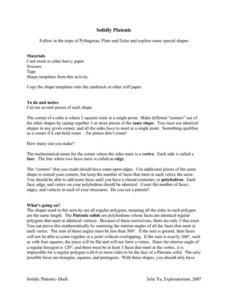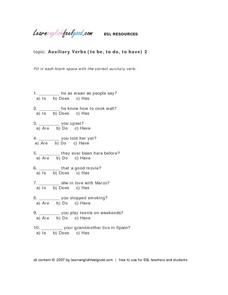Curated OER
"Too Much Pressure" by Colleen Wenke
Have you ever cheated on a test? What about copied someone else's homework? After reading Colleen Wenke's essay "Too Much Pressure," class members use the provided reading comprehension questions to focus their analysis of important...
Brigham Young University
Out of the Dust: Cubing Strategy
Imagine using a six-sided cube to encourage readers to analyze a topic in greater depth. Create a cube, label each of the six sides with one of Bloom's comprehension levels, and you're ready to launch a discussion of a text....
Media Education Lab
Understanding Viral Messages
Imagine advertising for a product but not being paid to do so. Welcome to the world of Viral Messaging. Class members first view a T-Mobile flash mob video that went viral and has been seen by over 14 million viewers. After analyzing the...
Syracuse City School District
Summary of Fiction and Non-Fiction Text
Somebody Wanted But So Then (SWBST)? Yes! Here's a great strategy for teaching young readers how to summarize narrative text. In addition, the packet includes exercises that show kids how to summarize nonfiction text using the classic...
PHET
Planet Designer: Retro Planet Red
What does the atmosphere on Mars look like? This fourth instructional activity in the series of five is designed for high schoolers. Scholars apply previous knowledge to add atmosphere to Mars in an online simulation. This comprehensive...
American Chemical Society
A Catalyst and the Rate of Reaction
More than 90 percent of chemical products are made using a catalyst. Lesson demonstrates the way a catalyst changes the rate of reaction without altering the chemical reaction. A catalyst doesn't appear as a reactant or a product, yet it...
SaveandInvest.org
Introduction to Earning Interest: Middle School
Does your bank pay you for allowing them to hold your money? Class members research three different ways they can earn money using money already in the bank. Topics include certificates of deposit, statement savings accounts, and...
Curriculum Corner
Native American Literature
Celebrate and honor Native American culture with this set of graphic organizers that showcases literature like The Girl Who Loved Wild Horses and A Boy Called Slow as well as three other Native American literature books....
Cornell University
Non-Newtonian Fluids—How Slow Can You Go?
Children enjoy playing with silly putty, but it provides more than just fun. Young scientists make their own silly putty using different recipes. After a bit of fun, they test and graph the viscosity of each.
American Chemical Society
Heat, Temperature, and Conduction
How does heat move from one item to another, even when the items are in different states of matter? Pupils experiment with adding washers to hot water and adding hot washers to room temperature water to observe the heat transfer.
Fluence Learning
Writing an Argument: Innovation in America
Are American young people prepared to become tomorrow's leaders in technological innovation, or does an obsession with being cool sidetrack essential skills? That is the question freshmen and sophomores must address in a performance...
Curated OER
Exploration of Utopias and Dystopias
If you are considering adding or expanding a unit on utopian and dystopian literature you simply must check out this fabulous resource. Packed with plans, activities, project-based and 21st century learning opportunities, the unit...
American Chemical Society
Can Liquids Dissolve in Water?
How does food coloring work? Classes watch a demonstration showing liquids dissolving in liquids. In groups, they then explore the ability of other liquids to dissolve in water (alcohol, mineral oil, and corn syrup) by setting up and...
Curated OER
The Class Trip
Mrs. Moore's class is trying to earn money for a trip to the science museum, but how much more do they need? Solve this problem with your own class as they develop their ability to model real-life situations algebraically. As an added...
Science 4 Inquiry
Maintaining Mass
Can you disprove the law of conservation of mass? Pupils observe the teacher weigh each part of a reaction. Then, the teacher weighs the result of the reaction and everyone sees that the products do not equal the reactants. Then they...
Curated OER
Solidly Platonic
When they do, they learn. Using this resource, young mathematicians learn about platonic solids by actually building, touching, and examining the shapes. They connect their observations about the shapes to Euler's formula.
Curated OER
Auxiliary Verbs (To Be, To Do, To Have) 2
In this auxiliary verbs (to be, to do, to have) worksheet, students decide which auxiliary verb grammatically completes each of ten sentences.
Teach Engineering
Rube Goldberg and the Meaning of Machines
A Rube Goldberg machine does not really look like it would make work easier. Introduce your class to Rube Goldberg with a resource that shows how his inventions make simple tasks harder to complete.
WindWise Education
Are Birds Impacted by Small Wind Turbines?
How do we know if the wind turbine at our school is impacting birds? Here, small groups work together and conduct field work in order to determine the impact of a human-made structure on birds. The groups also determine their searcher...
Curated OER
Grocery Shopping
Students build a functional vocabulary. In this ESL lesson, students watch a video that incorporates a lesson using "do" and "does" while grocery shopping. Students engage in a listening exercise where they listen for specific answers...
Curated OER
Do The Research! (Trivia Questions)
In this research worksheet, students use the Internet or other source to answer nine questions about different topics. Students write the sources for their answers.
Curated OER
Using a Dictionary - Sounds
In this research skills worksheet, students use a dictionary to answer the 4 questions on the worksheet. The questions have to do with word sounds.
Curated OER
Go or Do
In this verbs worksheet, students complete a 10 question multiple choice on-line interactive quiz about the proper use of the verbs "go" or "do".
Curated OER
Introduce Vocabulary: How Do Dinosaurs Go to School?
Learners discover the meaning of tier two vocabulary words. In this vocabulary lesson, students read How Do Dinosaurs Go To School? listening for 3 pre-selected, tier two vocabulary words. Words are defined by the teacher and...























